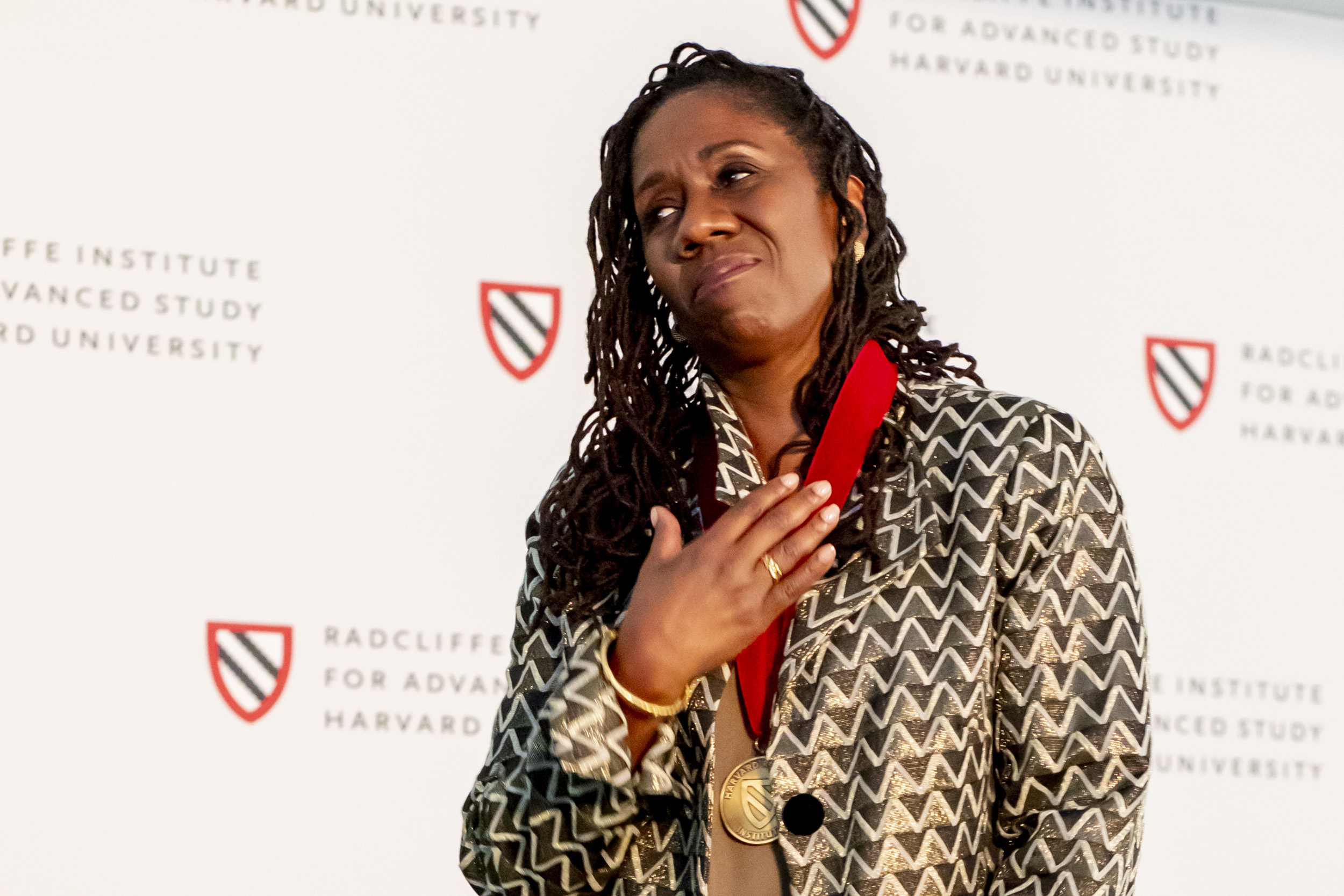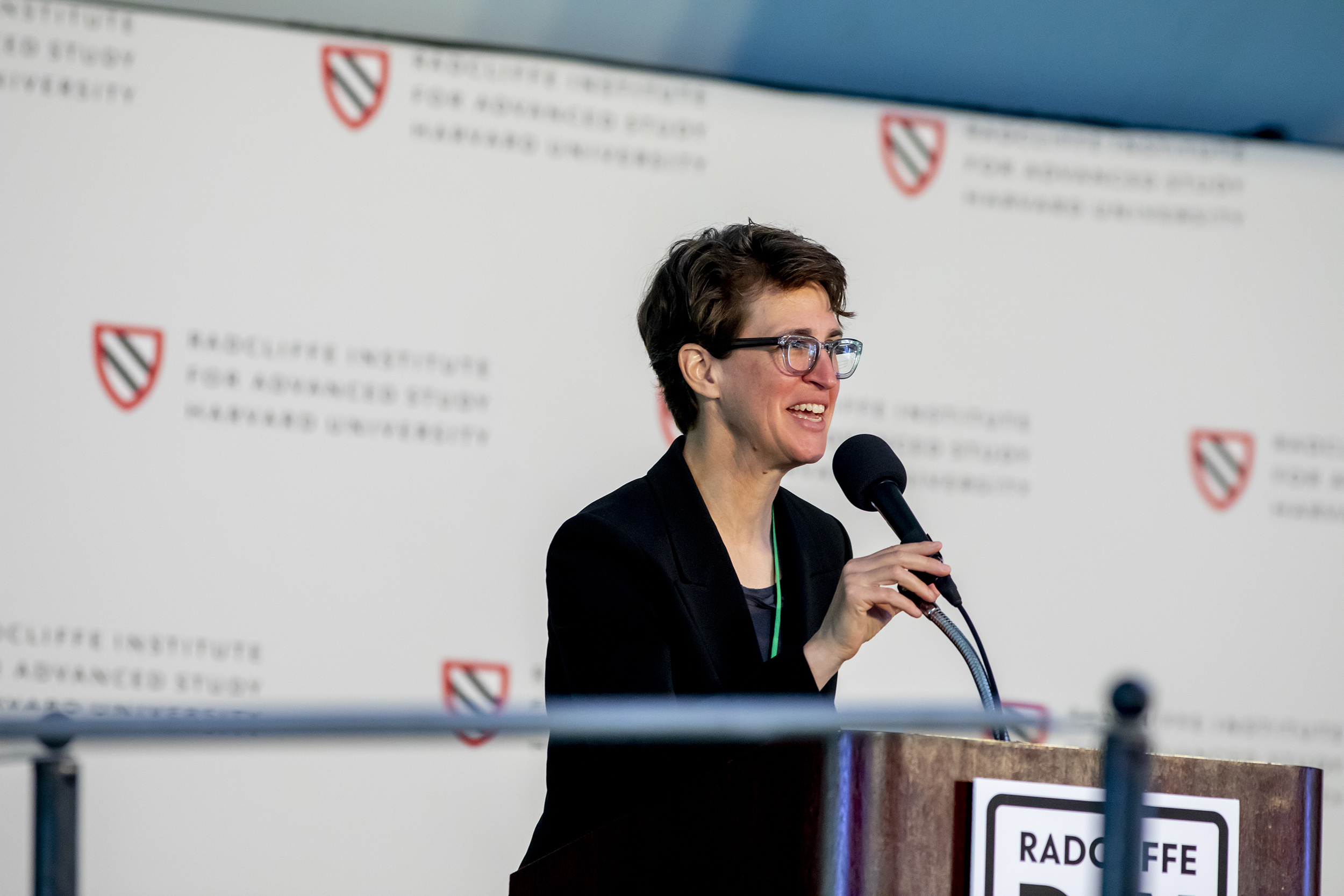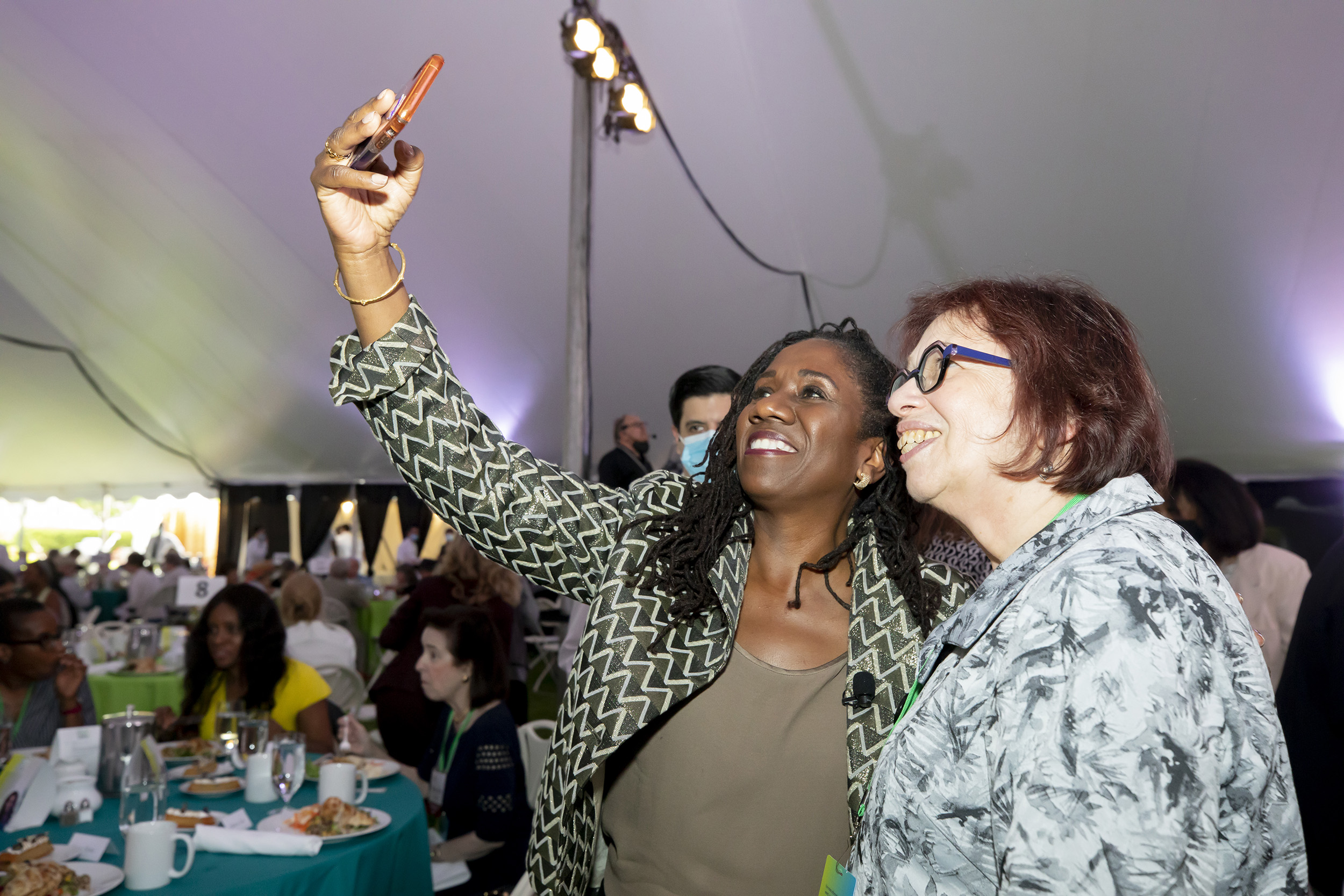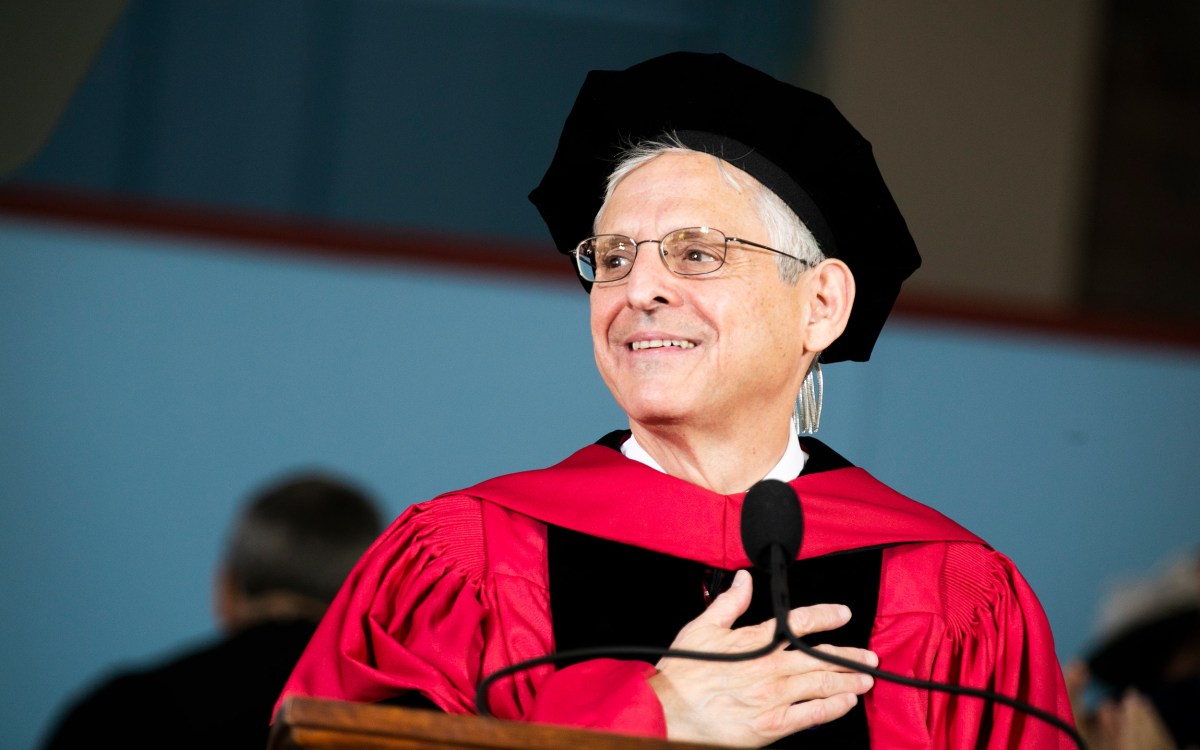
Sherrilyn Ifill, president and director-counsel emeritus of the NAACP Legal Defense and Educational Fund, receives the Radcliffe Medal.
Photos by Rose Lincoln/Harvard Staff Photographer
Time of ‘democracy in crisis’
Resist nihilism, get involved, take back power, says Radcliffe Medalist Sherrilyn Ifill
Citing “a democracy in crisis,” 2022 Radcliffe Medal recipient Sherrilyn Ifill issued a stirring call to action in the keynote discussion for Radcliffe Day on Friday.
There are “fundamental cracks in the foundation” of “every pillar that holds up democracy: education, the legal profession, journalism, the faith communities,” warned Ifill, president and director-counsel emeritus of the NAACP Legal Defense and Educational Fund (LDF). “We’re in a moment that’s incredibly sobering. Also a moment of opportunity if we are prepared to open our minds to understand how we got here.”
Ifill was joined for the discussion by Martha Minow, the 300th Anniversary University Professor and former Harvard Law School dean. Topics ranged from Ifill’s work with LDF, the nation’s premier civil rights law organization, to the responsibility that all Americans share for the future of our country.
A basic problem, noted Minow, “seems to be a loss of a sense of ‘we,’ of commonality.”
Ifill agreed, blaming a “nihilistic” strain in American society fueled by white supremacy. For example, she said, before the Brown v. Board of Education decision outlawing school segregation, “We had a public education system that white people were quite invested in. It was only when you had to share that system on an equal basis that you started to have a crack in the consensus.”
Protests following the murder of George Floyd “was a powerful ‘we’ moment,” said Ifill.
Recent legislation restricting voting and the Jan. 6 riot spring from the same selfishness. As Ifill explained it: White supremacists think, “If we have to share power equally in this democracy then maybe we don’t have one. Maybe I’m agnostic about elections. Maybe we don’t respect the peaceful transfer of power.”
Yet a sense of common humanity still exists, she argued, pointing to the protests following the murder of George Floyd. Involving “all ages, all races, all 50 states. It was a powerful ‘we’ moment,” she said. However, the protests also provoked a backlash legislation supposedly aimed at critical race theory. “When they saw people around the world responding, they saw the power of our shared empathy, and they decided you cannot teach about any subject that could cause feelings of anguish or guilt.”
The logic is fundamentally flawed. “When I was in the sixth grade we read ‘The Diary of Anne Frank,’” she recalled. “I felt guilt. I felt shame. I felt anguish. Not because I did anything, and not because anyone I knew had been a Nazi. As a human being, I felt empathy.” The new legislation, she said, is an attempt to “shut off the valve of empathy.”


MSNBC host Rachel Maddow introduced Ifill, who is pictured posing for a selfie with Pulitzer-winning journalist and Radcliffe alum Linda Greenhouse. Below, Radcliffe Dean Tomiko Brown-Nagin (from left), Harvard President Larry Bacow, and 300th Anniversary University Professor Martha Minow.

Ifill was asked about her hopes for the future of democracy, and she responded by invoking the immediate past. For the 2020 election, she said, “we decided to be relentless.” The result was not only the highest turnout in a presidential election ever but also a record turnout for the special election determining Georgia’s two Senate seats. “Of all the people who showed up for the presidential election in Georgia, 97 percent showed up for the special election,” she said, resulting in the first Black senator and the second Jewish senator ever to represent the state.
“We created a world that they felt was getting away from them,” she said. “The mobilization did bring more people into the tent.”
In the wake of the Uvalde, Texas, tragedy, Ifill called for more action. “Take a day of rest and hug your kids. Then start to think about what our points of intervention are.”
Citing her personal mantra of “leave no power on the table,” Ifill lamented, “We have left so much power on the table.” Not only do concerned citizens have to vote in presidential elections, she encouraged the assembly to vote in every election. “Don’t say, ‘I live in a blue state so it doesn’t matter.’ People react to turnout.”
Run for city council or school board, she told the crowd, and inform yourself and vote in the down-ballot races as well as the big ones. “The sheriff is the one who is going to decide who gets evicted,” she pointed out. “We have to get serious about power.”
Presented Friday by Tomiko Brown-Nagin, dean of the Radcliffe Institute for Advanced Study, the Radcliffe Medal is awarded to an individual who “embodies our commitment to excellence, inclusion, and social impact.” Introducing Ifill as “a public intellectual of the highest order,” Emmy award-winning MSNBC host Rachel Maddow called her “a leader, a fighter, an organizer, a builder of institutions — most importantly, a builder of Black institutions.”
“When I was in the sixth grade we read ‘The Diary of Anne Frank.’ I felt guilt. I felt shame. I felt anguish. Not because I did anything, and not because anyone I knew had been a Nazi. As a human being, I felt empathy.”
Sherrilyn Ifill
The day opened with a panel on “Higher Education Access and the American Workforce,” moderated by Raj Chetty, William A. Ackman Professor of Public Economics. Kicking off with a discussion of inequity in higher education, Donna Shalala, Trustee Professor of Political Science and Health Policy at the University of Miami, said one key is to cultivate culturally sensitive thinking in the recruitment and retention of students.
The former U.S. secretary of health and human services noted that traditional methods were often “too cookie-cutter” and instead pointed to a program from her time as chancellor of the University of Wisconsin that recruited Native American counselors to help retain Native American students. At Bunker Hill Community College, peer counselors — often “students who are Black or brown” — perform the same function, said Pam Eddinger, the college’s president.
Calling himself “the skunk at the picnic,” Anthony P. Carnevale, director of the Georgetown University Center on Education and the Workforce, dismissed the efficacy of such initiatives. Since the 1980s, higher education “increasingly promotes the maintenance of an American elite,” he said in his virtual appearance on the panel. He advocated instead for a focus on transparency that allows students and their families to identify the most remunerative trades and professions. “What you take determines what you make,” he said, calling employment “the only source of upward mobility in this country.”
Other panelists pushed back on this focus on specific jobs and wages. As founder and CEO of the National Education Equity Lab, Leslie Cornfeld ’81, J.D. ’85, pitched a more involved role for higher education, describing NEEL programs that bring early college experiences to schools where historically students have not seen higher education as an option. “We know universities can fly in and get the best athletes,” she said. “We want them to fly in and identify the best scholars as well.”
Eddinger added another objection to Carnevale’s proposal: “If we were to follow that model you would get lots of allied health care workers and lots of IT workers. But God forbid you need teachers.”
Making an impassioned plea for those assembled to “tackle the basic root causes” of inequity, Eddinger concluded: “We have refused to recognize that the people who teach our children, who care for our children, are as worthy as engineers. It is the responsibility of public intellectuals to lift up essential jobs so they are paid more than $15 an hour.”






